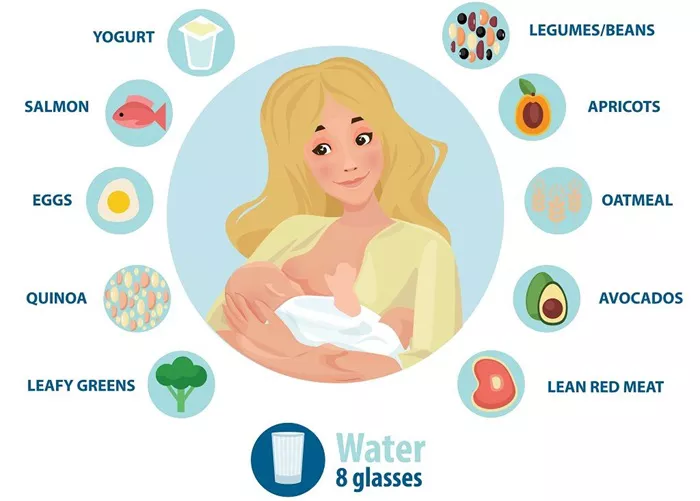Breast milk is a precious source of nutrition for infants, providing essential nutrients and antibodies crucial for their growth and development. However, some mothers may experience challenges in producing an adequate milk supply. While there are various factors that can influence milk production, including hydration, rest, and stress levels, diet also plays a significant role. Certain foods are known for their lactogenic properties, meaning they can help stimulate milk production in breastfeeding mothers. In this article, we’ll explore ten such foods that can assist in building and maintaining a healthy milk supply.
10 Foods to Help Build Milk Supply
1. Oats
Oats are a nutritional powerhouse for breastfeeding mothers. They are rich in fiber, iron, and protein, which are essential for overall health and milk production. Oats also contain compounds like beta-glucan that have been linked to increased prolactin levels, the hormone responsible for milk production. Incorporating oatmeal, oat cookies, or adding oats to smoothies can be an excellent way to boost milk supply.
2. Fenugreek
Fenugreek is a well-known galactagogue, a substance that promotes milk production. It contains phytoestrogens that mimic estrogen, a hormone that plays a role in lactation. Many breastfeeding mothers have reported an increase in milk supply after consuming fenugreek in various forms, such as capsules, tea, or adding fenugreek seeds to dishes.
3. Fennel
Fennel seeds are another lactogenic food that has been used for centuries to support lactation. They contain compounds like anethole that can help stimulate milk production. Fennel seeds can be consumed as a tea, added to salads, or used in cooking to enhance the flavor of dishes while benefiting milk supply.
4. Leafy Greens
Leafy greens like spinach, kale, and collard greens are packed with nutrients like calcium, iron, and vitamins A and K. These nutrients are not only beneficial for overall health but also essential for lactating mothers. Calcium, for instance, plays a role in muscle function, including milk production. Including a variety of leafy greens in salads, smoothies, or cooked dishes can contribute to a healthy milk supply.
5. Nuts and Seeds
Nuts and seeds, such as almonds, flaxseeds, and sesame seeds, are rich in healthy fats, protein, and minerals like calcium and iron. Flaxseeds, in particular, contain phytoestrogens that can support lactation. Snacking on a handful of nuts and seeds or incorporating them into meals and snacks can provide a nutritional boost for breastfeeding mothers.
6. Brewer’s Yeast
Brewer’s yeast is a nutritional supplement known for its potential to increase milk production. It is rich in B vitamins, protein, and minerals like chromium and selenium. Brewer’s yeast is often used in lactation cookies or added to smoothies and other recipes to support milk supply.
7. Garlic
While the strong flavor of garlic may not appeal to everyone, it is worth including in your diet for its lactogenic properties. Garlic contains compounds that can stimulate lactation and enhance milk production. Incorporating garlic into savory dishes, soups, or sauces can provide both flavor and lactation benefits.
8. Carrots
Carrots are not only nutritious but can also support lactation. They are rich in beta-carotene, which the body converts into vitamin A, essential for immune function and eye health. Additionally, carrots contain phytoestrogens that can aid in milk production. Including carrots in salads, stews, or as a snack can be beneficial for breastfeeding mothers.
9. Papaya
Papaya is a tropical fruit known for its digestive enzymes and nutritional benefits. It is also considered a lactogenic food that can help boost milk supply. Papaya can be enjoyed fresh, added to smoothies, or used in fruit salads to reap its lactation-enhancing properties.
10. Water and Hydration
While not a food, proper hydration is crucial for milk production. Breastfeeding mothers should drink an adequate amount of water throughout the day to stay hydrated. Dehydration can negatively impact milk supply, so aim to consume at least eight glasses of water daily, and more if you’re active or in hot weather.
Conclusion
Incorporating these ten foods into your diet can help support and boost milk supply while providing essential nutrients for both you and your baby. However, it’s essential to remember that individual responses to lactogenic foods may vary, and consulting with a healthcare professional or a lactation consultant is recommended, especially if you have concerns about milk production. Additionally, maintaining a balanced diet, getting enough rest, managing stress, and having a supportive breastfeeding environment are all factors that contribute to successful breastfeeding and a healthy milk supply.


